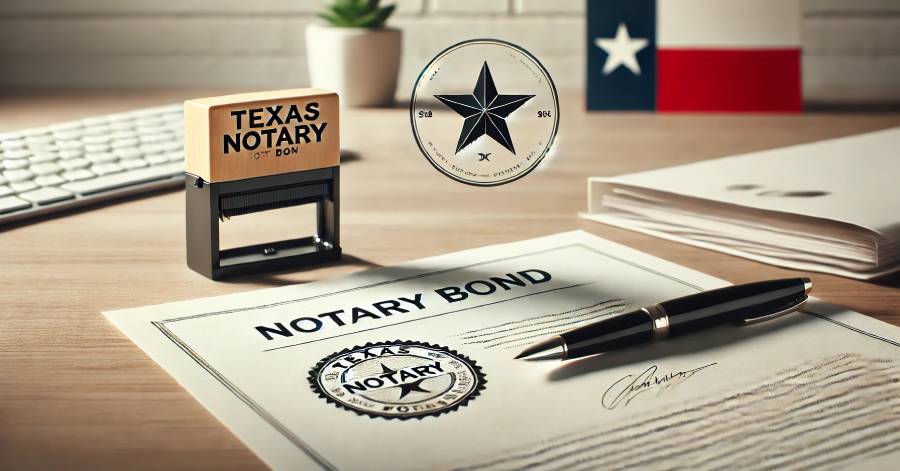What Is a Rider to Notary Bond?
Discover what a rider to a notary bond is and why you might need one in Texas. Get info on costs, reasons to use a rider, and how to apply.

A notary bond is a type of surety bond required to protect the public from errors or misconduct by a notary public. A rider is a legal amendment that modifies the terms of an existing notary bond, such as the bond amount or obligee.
This guide will explore what a rider is, why Texas notaries might need one, and how to get it quickly and efficiently.
What is a Rider to a Notary Bond?
A rider is a legal document that adjusts the terms or coverage of an existing surety bond without voiding it. It ensures that changes—such as updating the obligee, bond amount, or notary bond term—are legally recognized, maintaining compliance and coverage integrity.
What Is a Notary Bond?
Reasons to Use a Notary Bond Rider
A notary bond rider is essential for making legally valid updates to your bond, ensuring it reflects accurate information and remains compliant with Texas notary regulations.
Here’s why you might need one:
Update Personal Information
- Name Change: Reflect a legal name change.
- Address Change: Update your address after moving.
- County Change: Modify your bond if relocating to a new county.
Change Notary Bond Details
- Dates: Adjust the bond’s start or end date.
- Amount: Increase or decrease the bond value to meet requirements.
- Term Length: Extend the duration of your bond.
Update Obligee Information
- Adding or Removing Obligees: Modify who the bond is payable to.
Adjust Coverage Terms
- Coverage Conditions: Revise rules for the bond’s coverage.
- Clarifying Language: Make the bond’s terms clearer.
- Adding Signatures: Add necessary signatures for validity.
Business Structure Changes
- Entity Type: Update the bond to match a new business structure, such as switching to an LLC.
Correct Errors
- Fixing Mistakes: Amend errors in the original bond, like incorrect names or dates.
Legal Compliance
- Adhering to New Laws: Ensure compliance with updated Texas notary laws.
Other Specific Reasons
- Underwriting Changes: Satisfy new bond issuer requirements.
- Professional Updates: Reflect new certifications or qualifications.
Each of these scenarios highlights the flexibility and importance of a bond rider in maintaining your notary bond’s accuracy and legal compliance.
Do you need a Texas Notary Bond? Get one here!
How to Get a Rider to a Notary Bond
Getting a rider for your notary bond is a straightforward process that ensures your bond remains accurate and compliant.
Follow these steps to make the necessary updates:
- Contact Your Surety Provider: Reach out to the company that issued your original notary bond.
- Specify the Required Changes: Clearly explain the updates needed, such as a name or address change.
- Complete Necessary Forms: Fill out any forms provided by your surety company to process the amendment.
- Pay Applicable Fees: Be prepared for a small fee that some providers may charge for issuing a rider.
- Receive and File the Rider: Once issued, submit the rider to the appropriate state or county office to maintain bond validity.
With these steps, you can seamlessly update your notary bond and stay in compliance with Texas regulations.
Where to Get a Surety Bond for Notary in Texas
How Much Does a Notary Bond Rider Cost?
The cost of a notary bond rider is usually a flat fee, often around $25. However, some surety bond brokers may waive this fee altogether.
Unlike the cost of an original bond, factors like credit score or financial history do not influence the price, making it an affordable option for updating your bond.
Always check with your surety provider for exact pricing details.
How Much Does a $10,000 Notary Bond Cost in Texas?
Need Help with Your Notary Bond?
Bond riders are essential for keeping your notary bond accurate and compliant with Texas regulations.
Whether you need to update personal details, adjust bond terms, or meet new legal requirements, TMD Surety Bonds makes the process easy and hassle-free.
Ready to make updates to your bond? Contact Us today and let our experts guide you through every step!
Share This Post
Related Articles
Every year, Texas truckers and trailer owners face hefty fines due to improper weight distribution on a trailer. Misloading can...
Texas is one of the best states to start a trucking company, thanks to its booming economy, central location, and...
A real estate notary plays a crucial role in property transactions, ensuring that documents like deeds, mortgage agreements, and loan...
Get Started
The bonding process can be confusing and cumbersome. Our surety bond experts are standing by and ready to answer any questions. Let’s get you bonded today!


